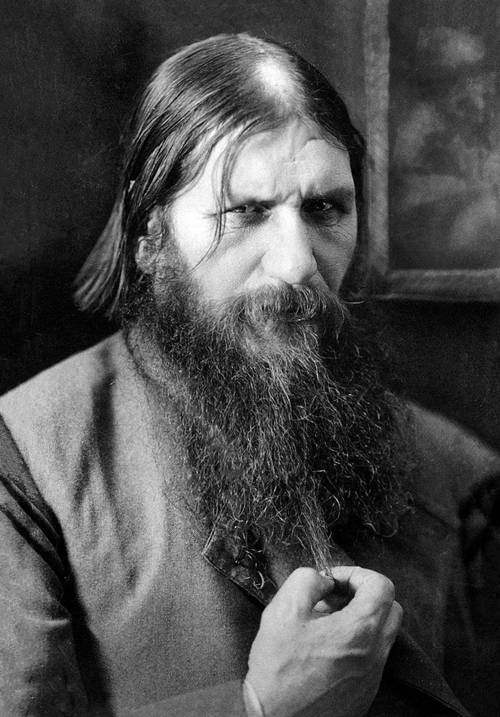
FAQ About Grigori Rasputin

Who was Grigori Rasputin?
Grigori Rasputin, born on January 21, 1869, in Siberia, was a Russian mystic and self-proclaimed holy man who became a prominent advisor and confidant to the Romanov family, particularly Tsarina Alexandra. He is most known for his influence over the royal family and his role in various political and personal matters, as well as his mysterious murder in 1916. His life and assassination have fueled many legends and controversies.

How did Rasputin rise to power within the Russian royal family?
Rasputin's rise to power began when he was introduced to Tsar Nicholas II and Tsarina Alexandra in 1905. His claimed healing abilities especially impressed the royal family, as he appeared to alleviate the symptoms of hemophilia suffered by their son, Alexei. This relationship grew as Alexandra believed Rasputin was essential for her son’s wellbeing, leading to his influential role in Russian politics.

What role did Rasputin play in Russian politics?
Though Rasputin did not hold any official political position, his influence on the royal family, particularly Tsarina Alexandra, was significant. During World War I, as Nicholas II was on the front lines, Alexandra often consulted Rasputin on state matters. This influence was resented by many Russian nobles and politicians, who viewed him as a corrupt and malevolent figure exacerbating the empire's problems.

Why was Rasputin controversial?
Rasputin was controversial due to his enigmatic personality, alleged promiscuity, and significant influence over the Russian royal family. Many in the Russian aristocracy viewed him as a destabilizing force, believing he wielded undue influence over Tsaria Alexandra, leading to poor political decisions. The mystery surrounding his life and his murder further added to his controversial legacy.

What is the story behind Rasputin's death?
The death of Rasputin is shrouded in mystery and legend. He was reportedly assassinated by a group of nobles on December 30, 1916, who believed his influence on the royal family had become too dangerous. According to some accounts, he was poisoned, shot, and ultimately drowned in the Neva River. However, the exact details of his demise have been the subject of debate and speculation.

Did Rasputin possess mystical powers?
There is no scientific evidence to support claims that Rasputin had mystical or supernatural powers. However, he was known for his charismatic presence and claimed healing abilities. His apparent ability to relieve Tsarevich Alexei's symptoms of hemophilia impressed the royal family, contributing to the myth of his mysticism. Whether these acts were truly mystical or merely coincidental remains a topic of debate.

How did Rasputin affect the fall of the Romanovs?
Rasputin's influence over the royal family and his involvement in political affairs made him a target for criticism. Many believed his presence and perceived corruption weakened the monarchy's credibility and stability, exacerbating existing political and social tensions in Russia. While not solely responsible, Rasputin’s role and the controversies surrounding him are often cited as factors that contributed to the Romanov dynasty's eventual downfall.

What were Rasputin's beliefs and teachings?
Rasputin's beliefs were a complex amalgam of Russian Orthodox traditions and mysticism. He considered himself a "holy man" and claimed spiritual insight, advocating for sincere faith and repentance. Despite his religious notoriety, he was often criticized for his contradictions, allegedly leading a life of debauchery, which contrasted with his charismatic teachings.

How did Rasputin influence Tsarina Alexandra?
Tsarina Alexandra valued Rasputin chiefly due to his perceived healing abilities for her son Alexei, who suffered from hemophilia. She believed Rasputin had divine intervention powers, which increased her dependence on him. This close relationship allowed Rasputin significant influence in court matters, especially when Tsar Nicholas II was away during World War I, leading Alexandra to consult Rasputin on political decisions.

What myths surround Rasputin's life and death?
Many myths and legends surround Rasputin's life and death. He is often depicted as a sinister, mystical figure with untold powers, partly due to sensationalized accounts of his assassination, where attempts to kill him involved poison, shooting, and drowning. These stories, while mostly exaggerated, contribute to Rasputin's larger-than-life persona in popular culture.

Was Rasputin a member of the Russian Orthodox Church?
Rasputin was not formally a member of the Russian Orthodox clergy, but he presented himself as a devout Orthodox Christian and spiritual healer. He was viewed with suspicion by church officials, particularly because of his unorthodox practices and lifestyle, which diverged from traditional Orthodox teachings.

What was Rasputin's background before he joined the Russian court?
Before joining the Russian court, Rasputin was born in a peasant family in the Siberian village of Pokrovskoye. He lived as a farmer, but his spiritual awakening led him to travel as a pilgrim, developing a reputation as a mystic and healer. It was this notoriety that eventually brought him to the attention of the Russian elite and the royal family.

How did Rasputin's assassination impact Russian society?
Rasputin's assassination was seen by some as a necessary act to remove his perceived corrupting influence on the royal family. However, his death did not stabilize the political unrest in Russia. Instead, it highlighted the deep divisions within Russian society and failed to prevent the further erosion of the Romanov reign, as the empire continued to face significant internal and external pressures.

Why did some Russians view Rasputin as a saintly figure?
Some Russians perceived Rasputin as a saintly figure due to his religious fervor and purported healing powers, especially regarding Tsarevich Alexei's health. His charismatic personality and mystical aura attracted a following among those who viewed his spiritual guidance as genuine. However, this view was not universally shared, and he faced substantial criticism and skepticism.

How did Rasputin's reputation affect his legacy in history?
Rasputin's reputation as a mystic and political influencer, compounded by rumors of debauchery and controversy, left a lasting mark on his historical legacy. He is often depicted as a symbol of the corruption and moral decline within the late Romanov court, and his life story continues to inspire intrigue and speculation, fueling various cultural depictions in literature, film, and art.

What evidence exists of Rasputin's actual influence over Tsar Nicholas II?
The evidence of Rasputin's influence over Tsar Nicholas II is mostly anecdotal, with historical records indicating that Rasputin's primary influence was over Tsarina Alexandra, who in turn influenced the Tsar to some extent. It is generally agreed that Rasputin’s direct impact on Nicholas II's decisions was limited compared to his wife, although the perception of his control was significant enough to concern many contemporaries.

Are there any surviving writings by Rasputin?
Yes, some writings attributed to Rasputin have survived, including letters and recorded sayings that reflect his spiritual beliefs and advice to the royal family. These documents offer insights into his thoughts and perspectives, although their authenticity and the extent to which they were edited or embellished remain subjects of scholarly debate.

What was Rasputin's relationship with other Russian nobles?
Rasputin had a contentious relationship with many Russian nobles, who often viewed him with suspicion and disdain. His rapid rise to influence within the royal court fueled envy and animosity, and his unconventional lifestyle and rumored manipulations led to significant friction. Many nobles were involved in conspiracies against him, culminating in his eventual assassination.

How did Rasputin's life influence modern culture?
Rasputin's life has left a significant impact on modern culture, inspiring various works of art, literature, film, and music. His enigmatic and scandalous persona has been depicted in numerous fictionalized accounts, often portraying him as a villainous or mystical figure. This enduring fascination underscores the intrigue surrounding his life and his role in Russian history.

What were some of the alleged miracles performed by Rasputin?
One of the most famous alleged miracles attributed to Rasputin was his ability to ease the suffering of Tsarevich Alexei's hemophilia, which impressed the royal family and reinforced his mystical reputation. Other accounts suggest he performed healing acts and exhibited prophetic insights, although these claims are largely anecdotal and lack verifiable documentation.
